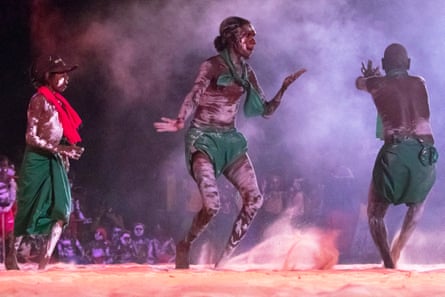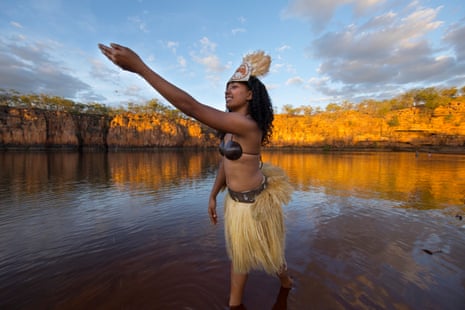The road from Beswick, the small Jawoyn community 100km south of Katherine, is a gauntlet of deep, sliding sand that rises in brown plumes with every passing four-wheel drive. The steering pulls, the cabin rocks, visibility drops suddenly to zero as the grey-green stringy barks cop another layer of dust.
“Sold Out. No Tickets Available at the Gate,” said the painted sign 20-odd kilometres back. There is no gate, as it happens. Instead, beyond a makeshift camping ground and a pair of unlikely shipping containers is a miraculous river, split into deep rivulets boarded over for foot traffic. Beyond that, rising from the bush, sits the most spectacular and perhaps the most logistically challenging festival site of all time.
Walking With Spirits isn’t done lightly.
The Djilpin Arts Centre stage sits on a vast swathe of white sand, which, in the wet season, would be largely underwater. Today it curves around a very deep, very long billabong fed by a waterfall ploughing through a fissure in the red cliff. Freshwater crocs are lying in the sun down that end, the whisper goes. Up here, local boys climb the rock face to leap laughing into the cool water.

This is the 16th year that Tom E Lewis – actor, musician, local mover and shaker – has staged his mostly word-of-mouth festival of music and culture. It looks like it will be the last. It’s largely the necessity of sending off four respected senior songmen, all of whom died in the last decade, that saw the 2017 proposal through the labyrinthine processes of the Northern Land Council and traditional ownership.
Lewis, the teenaged star of The Chant of Jimmie Blacksmith who is now better known as a Shakespearean stage actor, hosts the long night’s festivities in checked shorts, black singlet and fishing hat. With the ad-libbed style of a mad uncle, he talks us through the smoking ceremony for the four departed elders with intense affection and a lightness of spirit that makes us all feel like we belong, joking about whitefellas and blackfellas with the rare ease of a man with full lives in both worlds.
As dusk falls, the bunggul that follows has the same surreal blend of traditional ceremony and all-in celebration. The dancers’ dramatic advances are driven by didgeridoo, clap sticks and the keening chants of Gumatj songman Djakapurra Manyarryun, and cut by the shrieking laughter of children in white body paint watching from the side. They join in soon enough. At our host’s insistence, so does a trickle of intrepid whitefellas as the song cycle reaches its climax.

Yirrkala singer-songwriter Rrawun Maymuru is the first featured performer, bridging his tenure with rock band East Journey and a planned solo album with a set of acoustic guitar songs in Yolngu and English. A relative and torchbearer of Yothu Yindi’s “both worlds” philosophy, he introduces the story of ancient ancestors looking for water and the “mainstream” hit he wrote for Gurrumul, Bayini, with equal pride.
Benny Walker is next. MC Lewis highlights the young man’s Yorta Yorta roots but this music is pure blues-rock from the pubs of Melbourne, buoyed by clean, lyrical guitar solos and the throb of electric organ. Walker’s voice has the drag and timbre of a natural soul man. The red cliffs behind him begin to glow deep purple as the sun sinks behind the 350-strong gathering splayed across the sand.
There’s more family business now, in the form of a longer, more shambolic bunggul conducted by Lewis in between fond recollections of driving down this impossible track in an old Holden Monaro, fishing for barramundi and cooking it right there on the beach.
This time, over the course of a dozen chapters of didge, bilma and chant, more balanda families are coaxed into kicking up the sand, until Lewis is almost maniacal with the joy of communion.

Next in a program is a short film, Finding Maawirrangga, which describes our prodigal host’s connection to country in a poetic and funny narrative about exile and redemption. In short, Lewis’s movie career gravely unsettled cultural sensitivities back in the 1980s. His hard-won return to Numbulwar explains much of the passion that he brings to the festival.
It peaks tonight, in an energetic sense, with Fijian ensemble Rako Pasefika, whose log drums and shaking grass skirts and glistening flesh bring an exotic blast of Melanesian spectacle under the stars. A tearful lament for mother earth follows a theatrical arc from stage to sand, until the encroaching throng of children is forced back by a climactic juggle of fire-sticks and feel-good reggae.
The musical highlight of the festival, though, is the world premiere of Songs from A Bit na Ta: the latest project from Papua New Guinean superstar George Telek and Melbourne’s David Bridie. The unique atmosphere they conjure together has been a simmering secret since the groundbreaking Not Drowning Waving album of 1990, Tabaran, which they recall in an affectionate two-handed flashback to Abebe.
Tonight, as part of a five-piece PNG/Australian ensemble, their blend of Tolai tradition and synth/guitar ambience suspends time. The hypnotic hum of jungle field recordings, woody percussion and sonorous vocal harmonies is enhanced by a triptych of projected images contrasting scenes of dense tropical rainforest, mystical ceremony and stark colonial occupation.
As midnight approaches and families drift off to camp in the dunes, or take their chances on the sandy track back to Beswick, Tom E Lewis is understandably reluctant to cede the stage.
“We need to carry on the tradition, like this river,” he says, promising to find another place “just as beautiful” for Walking With Spirits next year. That seems kind of unlikely. But no more so than this.
